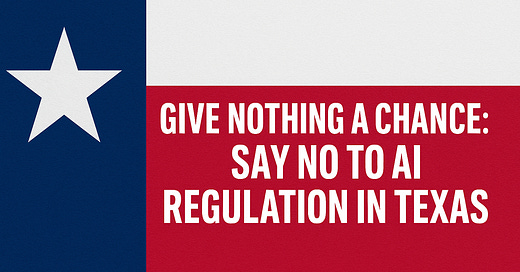Texas Should Reject HB 149: AI Regulation Gone Too Far
Texas is on the verge of making a huge mistake. And it won’t just cost us money—it could cost us the future.
Hello Friends!
Texans believe in building the future—not regulating it into oblivion. Yet HB 149, a progressive-style AI bill authored by Rep. Giovanni Capriglione, would cost taxpayers over $55 million over five years, expand government, and mirror failed policies from California and Colorado.
This commentary, originally posted as an article on X, explains why the Texas Senate must reject HB 149, consider HB 3808 as a better alternative, or better yet—give freedom a chance by doing nothing at all. Thoughts?
Texas Should Reject HB 149: AI Regulation Gone Too Far
Texas is on the verge of making a huge mistake. And it won’t just cost us money—it could cost us the future.
HB 149, the second iteration of last session’s failed HB 1409, aims to regulate artificial intelligence under the banner of “responsibility.” But don’t be fooled. This bill—authored by Rep. Giovanni Capriglione—would expand government, stifle innovation, and impose California-style overreach, undermining the freedom that makes Texas strong.
According to the fiscal note, HB 149 would cost taxpayers more than $55 million over five years, grow government by 20 new full-time employees, and empower the Attorney General to penalize developers and businesses for undefined “discrimination,” including on political viewpoints and biometric identifiers. It opens the door to chilling speech, increasing litigation, and dragging Texas down the same path as progressive AI legislation that already failed in Connecticut and California, but unfortunately passed in Colorado.
Why is Texas copying California? The Texas Senate Committee on Business and Commerce held a hearing on May 1 for testimony on HB 149. But the Committee left it pending, where the bill should stay and die.
By contrast, HB 3808, by Rep. Brian Harrison, is a model of restraint. It would create a temporary advisory council focused on state agency use of AI—not private sector innovation. It sets up a sandbox environment to allow safe testing of new technologies and sunsets in 2029. No bureaucracy. No sweeping mandates. No innovation-killing red tape. Unfortunately, the Texas House's Delivery of Government Efficiency (DOGE) Committee hasn't heard this bill yet. It may not, given that Rep. Capriglione is the chair of it and wants to push his big-government bill.
Even better than HB 3808? Do nothing. If lawmakers aren’t confident, then don’t legislate out of fear. Let freedom work.
We don’t need to ban, restrict, or punish technology because some policymakers are uncomfortable with progress. Texas should lead with humility, freedom, and a commitment to learning before regulating.
The Texas Senate must save our tech future. It can stop HB 149 before it becomes law, back HB 3808 as a better alternative, or simply do nothing—and let freedom work.
Let’s not build a $55 million bureaucracy to fear the future. Let’s lead it instead!




Texas, this session, seems to have a lot of bills in consideration that would result in being huge mistakes; that is to say, positive on the surface of it, or spin of it, but when you read the language, realize the implications, or appreciate what's really possible (or ethical), the Legislature seems to be a bit of a mess this year.
If I were to hazard a guess, it's that money and power are exerting control (and that's a terrible thing), because we have bills that just shouldn't exist (violate rights), can't be enforced (arguably, such as this), or bills that will cause more harm under the guise of good intentions (some of the Family related issues).
If ever there was a time for Texans to be more aware, more involved, and more concerned, it's now.